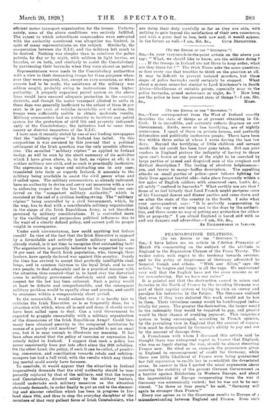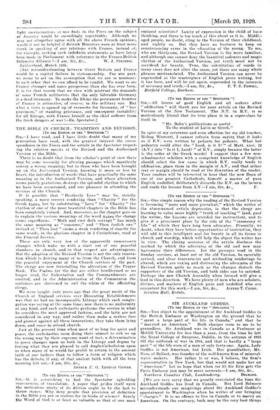FRANCO-BRITISH RELATIONS.
[To THE EDITOR OF THE " SPECTATOR. 'I Sus —I have before me an article in t'Action Francaise of March 8th commenting on the subject of the attitude in England to the Reparation Clauses of the Peace Treaty. The writer refers with regret to the tendency towards revision. and to the policy of forgiveness of Germany advocated. by General Gough and others. " With our Allies," says the article, "to forgive and forgot is all the rage. We understand very well that the English have not the same reasons as we for remembering. But we have our ruins."
It is pointed out that the .destruction caused to mines and factories in the North of France by the invading Germans was part of their regular system of trying to ruin an enemy and paralyse his industries in the future. The Germans realized that even if they were defeated this work would not bo lost to them. Their victorious enemy would be handicapped indus- trially for years. The greater the destruction, the larger would be the indemnity they would be required to pay, and greater would be their chance of avoiding payment. This iniquitoss system is being encouraged, according to French opinion, by the prevailing view in England that the amount of repara- tion Inuit be determined by Germany's ability to pay and not by the amount of damage done.
A Frenchman with whom I discussed this article said he thought there was widespread regret in France that England, who was so loyale during the war, should be almost deserting France now. He cited as an example the prominence given in England to encouragement of credit for Germany, while there was little likelihood of France even being guaranteed her full reparation to enable her to re-establish the devastated areas. In answer to this I quoted the usual arguments about ensuring the stability of the present German Government am a barrier against Bolshevism in Western Europe, and about the impossibility of Europe recuperating from the war it Germany was economically ruined; but he was not bo be con- vinced. "In three or four yearn," he said, " Germany will again be stronger than France."
Every one agrees as to the disastrous results to Europe of 3 misunderstanding between England and France. Even such light recriminatioes as one finds in the Press on the subject of America would be exceedingly regrettable. Although we may not altogether agree with all the above French opinions, would it not be helpful if British Ministers were at least more frank in speaking of our relations with France, instead of, for example, making such indefinite statements as have lately been made in Parliament with reference to the Franco-British [Any misunderstanding between Great Britain and France would be a capital failure in statesmanship. For our part, we mean to act on the assumption that we are so necessary to each other that we can afford to be candid. We want to see France stronger and more prosperous than she has ever been. It is for that reason that we view with mistrust the demands of some French militarists that the only tolerable Germany is a dead Germany. To make the Rhine the permanent frontier of France is attractive, of course, to the military eye. But what a vista is opened up of revanche for Germany, of "lost provinces," of standing grievance, and consequent instability for all Europe, with France herself as the chief sufferer from the fresh dangers of war !—En. Spectator.]





































 Previous page
Previous page